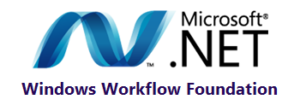 13. What is a host process?
13. What is a host process?
A host process is an executable program that hosts a workflow. It may be a Windows Forms application, a Web application, or a Web service application. You can use Web services in the host process or remoting to enable other applications to communicate with the workflow
14. What are runtime services?
Runtime services consist of predefined and user-defined classes that are available to the workflow runtime engine during execution to customize the behavior of workflow runtime. Some of the runtime services available in WF 4.0 are as follows:
Scheduling services – Enable creating and scheduling new workflow instances for execution.
Work batch services – Enable behavior to maintain a stable and consistent execution environment.
Persistence services – Enable you to save or restore the state of a running workflow for later use. You can restart the saved workflow anytime in future, even after weeks of inactivity.
Tracking services – Enable you to monitor the state of the workflows. This is particularly useful when you have multiple workflows active at the same time (for example, in a shopping cart application).
Timer service – Manages the timing required by the DelayActivity activity.
Transactions services – Provide the transaction support needed for data integrity.
Data exchange services – Manage custom communication services.
Threading services – Administer physical threads used to execute workflow instances.
15. Which component of WF architecture is responsible to execute each workflow instance?
WF runtime engine is responsible to execute each workflow instance.
16. Which option do you need to select for the Condition property, if you want to create a code condition?
You can select the Code Condition option to create a code condition.
17. Explain Custom Activities.
In addition to the standard activities available within the base activity library, you can create new activities to meet specific business needs. Creating custom activities may be required to support a particular application that you want to integrate with WF. Custom activities are generally created through attributes and inheritance. You can create two types of custom activities, base and composite. You can create basic custom activity by inheriting the Activity class and custom composite activity by inheriting the compositeActivity class or a derived type.
18. What is a dynamic update?
Dynamic update is a powerful feature of WF that describes the ability of WF to modify the execution path of a running workflow. This feature is used in circumstances that call for extraneous behavior that was not modeled by the original workflow developer.